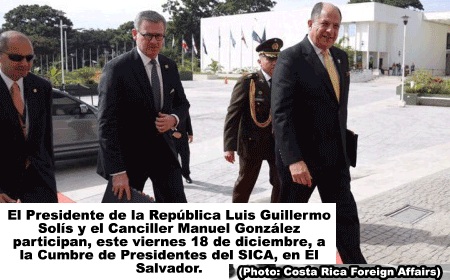BELIZE CITY, Mon. Dec. 21, 2015–Costa Rica’s Foreign Affairs Ministry confirmed via a statement issued online on Friday night, December 18, 2015, that it had earlier today suspended its political participation in the regional integration body – Central American Integration System (SICA, Spanish acronym) – and had withdrawn from high-level regional meetings that were being held in El Salvador over the decision by Belize, Guatemala and Nicaragua to not allow Cuban migrants stranded in that country to transit through their borders.
Costa Rica president Luis Guillermo Solís urged the countries within SICA to work together to reach a humanitarian agreement for the thousands of Cubans who remain in Costa Rica but who want to migrate to the USA.
The Cubans have been using a Central American corridor to seek special migrant status under the “wet-foot, dry-foot” policy, which provides special privileges for Cubans to legitimize their status in the US, even if they arrive without papers, but which turns them back to Cuba if they are detained at sea.
Costa Rica explained that it is withdrawing from the political bodies within SICA, but not from those that are economic, commercial or technical in nature.
It furthermore announced on Friday its decision to stop issuing temporary transit visas to Cuban migrants, who, at last report, had grown from 3,000 at the time when the request was made to Belize in early December to 5,989, with another 2,053 reportedly waiting to transit from Panama’s border.
Costa Rica’s statement calls on Cubans who have not yet reached Costa Rica to not attempt entry, warning that those who come will not be admitted and those who enter illegally will be deported to Cuba.
Costa Rica took the decision because it is unable to maintain the thousands of migrants seeking to find their way to the US.
Nicaragua stopped receiving Cuban migrants in mid-November, and three other countries within SICA have declined a request from Costa Rica to let the Cubans through their borders.
Belize was the latest country to turn down the request earlier this month. However, it did not completely close the door on the Cubans, but explained that while it could not currently facilitate their passage, it would be prepared to participate in a regional discussion to identify the necessary mechanisms to address the problem.
A recently published Declaración del Gobierno Revolucionario de Cuba, dated December 1, 2015, states that Cuba’s position was clearly expressed at a meeting of the 8 SICA countries held on November 24, 2015, in El Salvador, to which Mexico, Ecuador, Colombia and Cuba were invited.
According to Cuba’s declaration, the SICA countries had called for the adoption of strong and immediate measures to prevent illegal migration flows through their territories and they also spoke out against the US’s “wet-foot, dry-foot” policy for Cubans, as well as other programs which are said to promote “illegal, unsafe and disorderly emigration from Cuba for political purposes,” and which, they allege, are discriminatory against other Latin American and Caribbean migrants who are permanently deported, and who suffer abuse, separation of families and the violation of their human rights.
In a statement issued on Saturday, December 19, 2015, Guatemala’s Ministry of Foreign Affairs expressed regret over Costa Rica’s withdrawal from the SICA meetings and pointed to the need for an effective and lasting solution to the problem.
It furthermore restated its stance against preferential treatment of Cuban migrants over others in the Northern Triangle (Salvador, Honduras and Guatemala), noting that the Cubans in question aren’t political refugees, nor have they been victims of war or natural disasters. The Guatemalan Foreign Affairs Ministry notes that over 102,000 Guatemalans have been deported back home from the US since the year began.
Belize Foreign Affairs Minister Wilfred “Sedi” Elrington attended the SICA meetings. Foreign news reports indicate that technical meetings being held by SICA are discussing proposals for addressing the crisis of the Cuban migrants.

